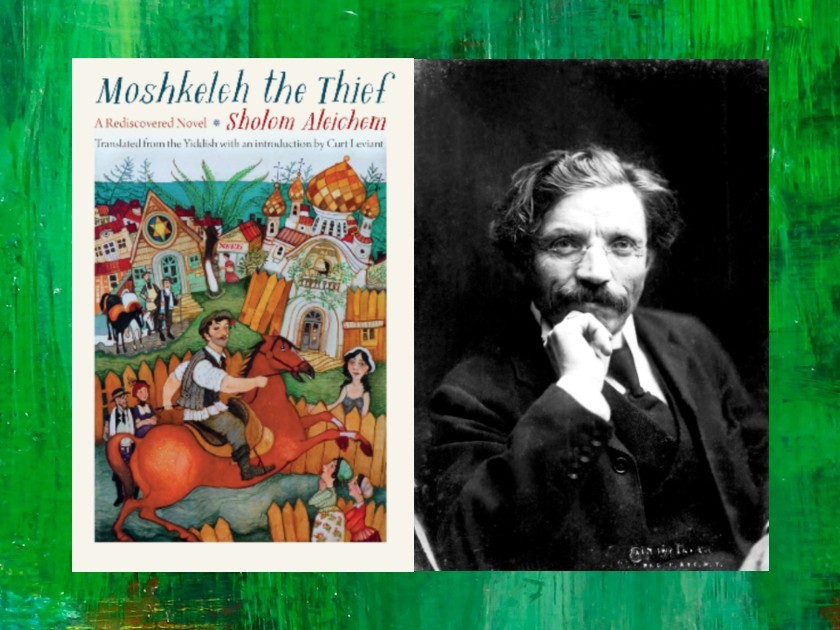
Portrait of Sholem Aleichem in New York, from Beit Sholem Aleichem, 1907
The great Yiddish writer Sholom Aleichem (1859−1916) has always been connected with humor. And he will now be associated with the genre of mystery, due to my rediscovery of a long-forgotten and neglected novel of his, Moshkeleh the Thief (forthcoming on September 1st from The Jewish Publication Society, in cooperation with the University of Nebraska Press).
So, then, what is the mystery linked with this iconic Yiddish humorist?
The mystery of this novel’s disappearance goes back to the creation of the classic twenty-eight ‑volume Complete Works of Sholom Aleichem, a project that was begun after Sholom Aleichem’s death in New York City. Moshkeleh the Thief was left out of this endeavor. We can only speculate that perhaps the family thought that a work by Sholom Aleichem that deals with thieves and the Jewish underworld was not considered fitting or not representative of his work.
And yet Sholom Aleichem himself regarded the story of Moshkeleh as a great achievement. His view that Moshkeleh Ganev (the original Yiddish title) was important is reflected in two letters he wrote in 1903. In one, the author predicts that Moshkeleh Ganev will have the same success as his popular second novel, Stempenyu (1889). In another letter he states: “I now feel as if I’ve been born anew, with new — brand new — strength. I can almost say that now I’ve really begun to write. [Sholom Aleichem’s emphasis.] Until now I’ve only been fooling around.”
With this novel Sholom Aleichem enters a Jewish arena that had not hitherto been explored in Yiddish fiction. Perhaps this is why Sholom Aleichem felt that he had “been born anew.”
Moshkeleh Ganev is also significant for Sholom Aleichem’s approach to his material. Yiddish literature had long maintained a tradition of edelkeyt, refinement. Yiddish and Hebrew authors eschewed violence, the darker side of life, and people on the fringes of respectability. But Moshkeleh Ganev signals Sholom Aleichem’s literary thrust away from this almost self-imposed silence. With this novel he enters a Jewish arena that had not hitherto been explored in Yiddish fiction. Perhaps this is why Sholom Aleichem felt that he had “been born anew.”
With his going through the edelkeyt barrier in this 1903 novel, Sholom Aleichem paved the way for a more inclusive, more realistic, and less sentimental approach to describing the Jews in Eastern Europe. By taking horse thieves as his subject and focusing on a man who is rejected by society, Sholom Aleichem enters uncharted literary territory. He writes with compassion, fidelity and occasional humor about Jews from the underclass, dealing with thieves and petty criminals who challenge the mores of Jewish and general society.
In Moshkeleh the Thief we have a Sholom Aleichem work that includes adventure, romance, suspense, surprising characters with their own vernacular, a novel that truly reflects the author’s own assessment of his creative strengths.
Curt Leviant is the prize-winning author or translator of more than twenty-five books. His latest novel is Me, Mo, Mu, Ma & Mod; or, Which Will It Be, Me and Mazal, or Gila and Me?